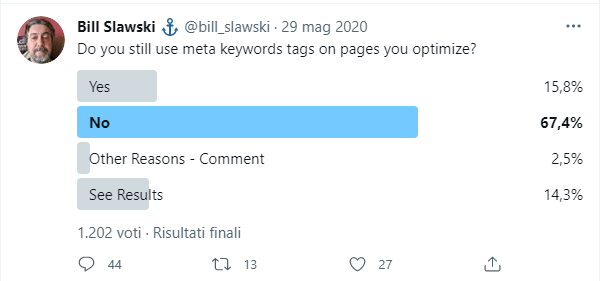What is the keywords meta tag and why Google no longer uses it
Since the first days of the SEO, the meta tags have been useful to communicate to Google the true content of the web pages and to report some information on how they should be displayed in the SERP; still today, more than twenty years later, the search engine relies in part on some meta tags to understand the relevance of the content with respect to user search queries, in particular for title tags and meta description (which can also positively influence the organic CTR). And then there is the keywords meta tag that, although it has been defined useless for over ten years, continues to return in the speeches of those who own or manage a site: That’s why it’s time to analyze what these elements are and why it no longer makes sense or usefulness to insert them into pages.
What is the keywords meta tag
The keywords meta tag is a list of keywords, usually separated by commas, pertinent to the content of a page, that you can (still) insert in the <meta> tag in the <head> section of an HTML document, as in <meta name=”keywords”>.
Meta keywords are a <meta> tag option that could be used to provide more information to search engines about what a page is about.
In general, meta tags are snippets of text that are part of HTML tags and describe the content of a page to search engines and website visitors; they are not shown directly on the page, but only appear in the source code (Ctrl+U). These are, essentially, simple and brief elements that describe the content and help search engines to have more information to understand what a web page is about.
Keywords meta tag: improper use and abuses
For a long time – and by many – meta tag keywords has been considered an opportunity to “legally” insert hidden keywords on pages for search engines.
For example, black hat SEO professionals once used the meta keywords attribute to hijack website traffic, adding in their metadata keywords that actually had no relevance to their content in an attempt to steal traffic from the most popular pages this way.
Another very frequent technique was a variation of the classic keyword stuffing: instead of stuffing the text on the page with keywords, a very long list of keywords was inserted in the meta attribute, whether they were pertinent or not (often minimal variants, or misspelling and so on).
Keywords meta tag and SEO: no value on Google since 2009
These elements then proved too easy to manipulate and too exposed to attempts to force the hand unlawfully for ranking: also for this reason, Google eventually decided to devalue the tool.
We can say, without a doubt, that currently Google does not use the keywords meta tag at all for its algorithm and that these keywords are no longer a direct ranking factor.
In the words of Matt Cutts, back then Big G’s main public face, “our web search (the well-known search engine on Google.com that hundreds of millions of users use every day) completely ignores meta tags for keywords, which at the moment have no effect on the ranking of our search results”.
The history of the keywords meta tag for the SEO
As Tommy Griffith traces back, the keywords meta tag began to spread around 1995 for old very archaic search engines, and was used at least until 2009, when Google made official that it does not use it for web ranking.
In fact, most search engines probably stopped using it long before 2009, which however is used as a date precisely because the year in which Google put a tombstone on its use for SEO.
At the dawn, the basic idea was that webmasters who were designing the content of the page could indicate to search engines what the page was about by entering the keywords for which they wanted to classify themselves in the meta tag keywords field.
At that stage, “search engines evaluated web pages solely on the basis of their content and not to the so-called external factors, such as the links to a web page,” Cutts explained in 2009.
The problem is that, basically from the start, “every single site owner in the world spammed it as hard as they could,” Griffith recalls: simply, people did not use relevant keywords, but only added irrelevant keywords that were not needed and “turned everything into a conquest of ground for traffic powered by keyword stuffing”.
And so, the meta tags related to keywords have become in no time “an area where you can also include often irrelevant or visible keywords to normal visitors”, and given this frequent inappropriate use, Cutts said in 2009 that “a long time ago Google started to ignore the keywords meta tag” – and some observers have even linked Google’s rise precisely to the decision to use other elements to evaluate the ranking compared to older search engines that relied too much on this tag.
A field without any SEO value
We can then reiterate without too many fears that the meta tag keywords has lost almost all its SEO value, and then to fill this field is a waste of time – and it is at least from 12 years, if not more.
The “almost” depends on some extra evaluations that can be made about the possible “alternative” uses of this element nowadays, as well as on the possible use that other search engines make of it.
For example, various analysts report that some of the less popular CMS, including SOLR, Algolia and those based on Elasticsearch, use keywords meta tag for internal site searches – while programmable Google search is not based on meta keywords elements.
Moreover, there are also those who “recycle” this tag as an internal keyword encoding system, setting the tag as the target keyword on each page. In this way, there is also the possibility of avoiding keywords cannibalization, since all it takes is for us to just check beforehand whether that keyword (or series of keywords) has already been used for a content.
In principle, it would be better to spend that time on improving other parts of the site, although there are those who maintain that meta keywords can still help define the context of the page and give internal guidance to copywriters and other team members on what you want to be the heart of the page (this applies especially to large companies and larger projects, where more people work on the same content, perhaps at different times and stages).
The keywords meta tag on other search engines
Last year, Bill Slawski published a Twitter poll asking his SEO followers if they were still using this meta tag; the result was quite surprising, because almost 16% admitted to using these keywords, also motivating their choice.
In particular, many have explained that they use the keywords meta tag for the optimization of search engines other than Google, which prompted Slawski to investigate the topic. This is how the search engines behave with respect to the meta keywords attribute.
- Google. It seems certain that Google does not use elements of meta keywords
- Bing. To Bing, as well, the keyword meta tag is dead in terms of SEO value and is ignored and excluded. However, there is a possibility that the system uses the meta keywords element to identify whether a page is trying to spammer.
- Yandex. Yandex support pages (the most used search engine in Russian) tell us that it is still using the meta keywords element.
- Baidu. There are no official reference sources, but the Chinese search engine Baidu should not use meta tag keywords, although it used it at least until 2018 during crawling and ranking.
- DuckDuckGo / Naver. Again there are no official sources, but probably these two search engines still use the keywords meta tag.




